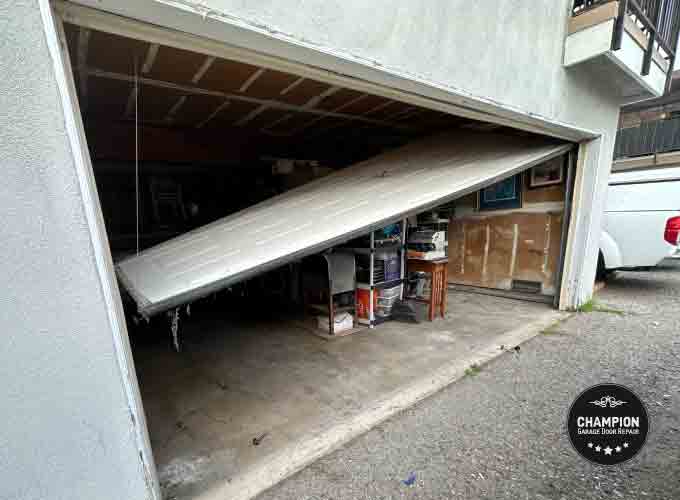Did you know your garage door is one of the hardest-working systems in your home? Overhead garage doors utilize a complex network of mechanical components and advanced technology to function smoothly. However, daily use, wear and tear, environmental factors, and human error can all contribute to recurring issues. But these aren’t the only reasons behind frequent breakdowns. Let’s explore six common reasons your garage door might keep breaking down.
1. Normal Wear and Tear
Your garage door is a mechanical device, and just like your car for example, it requires regular upkeep and occasional repairs. The primary reason for frequent issues is normal wear and tear. Over time, the garage door’s moving parts naturally degrade from constant use. Friction, heat, and stress contribute to gradual failure, common problems, and eventual breakdowns.

A single worn component can impact the entire system, leading to repeated breakdowns. Here are some common examples:
- Bearings: A worn garage door bearing may stick or bind as the door moves up or down, causing the cable to repeatedly come off the pulley and the door to come off its tracks.
- Springs: Worn or broken springs may fail to provide the proper tension to support the garage door. This can prevent the door from opening or closing and, in severe cases, cause it to come off the tracks.
- Rollers and Hinges: A single worn roller or hinge may cause the door to stick or bind, leading to problems with smooth opening and closing.
2. Technology and Complexity
Modern sectional garage doors are more complex, with significantly more moving parts compared to traditional single-piece garage doors. These doors also feature advanced technological and safety systems, driven by technological advancements and regulatory requirements. For example, most modern door openers come with built-in Wi-Fi systems, battery backup systems, and a travel module.
While these innovations offer greater functionality, they add complexity and introduce more components that are prone to malfunctions. This directly contributes to an increase in repairs, as well as higher replacement part and repair costs.
3. Poor Maintenance
Poor maintenance could also be a common reason why your garage door keeps breaking, as it directly affects the longevity and performance of the overhead door system. When a garage door is not properly cared for, small problems can quickly escalate into costly and recurring breakdowns.
Garage doors often require regular service and maintenance, including lubrication, balancing, alignment and inspections of safety systems. Error codes, unusual noises, vibrations, or performance issues are often signs of underlying problems. If these are ignored, minor issues such as a loose hinge can evolve into major mechanical failures.
4. External Factors and Weather Conditions
External factors and weather conditions can contribute to repeated garage door breakdowns. The elements can directly impact the garage door’s mechanical components, electric opener, and the overall structural integrity of your garage door system.
In cold temperatures, metal components of the garage door can contract, creating tighter tolerances in the door’s moving parts and increasing friction. Over time, this can accelerate wear and lead to breakdowns.
Rubber and plastic components become more brittle in cold weather, raising the risk of cracks, fractures, or other mechanical failures.
Low temperatures can also increase resistance in electrical circuits, reducing the efficiency of your electric garage door opener. Additionally, moisture buildup can cause electrical components to corrode and malfunction.
5. Modern Economy
As the saying goes: “They don’t make things like they used to anymore.” More frequent breakdowns and repairs of your garage door could result from planned obsolescence, a strategy used by manufacturers to increase production and profitability.
6. Poor Installation and Defects
Problems and recurring garage door issues and breakdowns might stem from improper installation, substandard parts, or manufacturing flaws. Below are some common issues that can cause your garage door to malfunction repeatedly:
- Hardware: Using incorrect hardware, such as springs, hinges, rollers, or tracks, can negatively impact your garage door system. For instance, using torsion springs that produce the wrong torque output may result in irregular noises, increased stress on the garage door opener, and even cause the door to come off the tracks.
- Misalignment: Misalignment of the torsion assembly, tracks, or supporting brackets can cause various problems, such as grinding of the torsion tube, bearing issues, hinge malfunctions, poor performance, and accelerated wear on the garage door.
Know the Difference!
Garage doors are specialized mechanical systems that withstand heavy and continuous use. Unlike standard entry or sliding doors, which have minimal moving parts, garage doors feature numerous components, including springs, cables, rollers, tracks, and openers. Together, these parts handle the substantial weight of the door, which can range from 150 to over 800 pounds, depending on its size and material.
The complexity of garage doors means that wear and tear is more frequent and impactful, often affecting the entire system. While a traditional entry door might only need occasional repainting or hinge adjustments, garage doors require regular maintenance, such as lubrication, alignment, and safety system inspections.
Modern garage doors also incorporate motorized systems with advanced technologies like Wi-Fi-enabled openers and safety sensors, adding complexity and potential points of failure. Understanding these differences explains why garage doors tend to experience issues more frequently than traditional entry doors. It also highlights the importance of proper care and maintenance to ensure your garage door’s safety, longevity and reliable performance.
Does Your Garage Door Need Frequent Repairs?
Garage doors older than eight years often require more frequent repairs while doors subjected to heavy use (more than five cycles per day) usually begin needing increased maintenance after 4–5 years of operation.
If your garage door frequently breaks down, you’ll eventually need to decide whether to repair or replace it. Make the best choice by carefully considering your options and the costs. Consult a licensed garage door repair contractor for a thorough inspection and professional advice.







